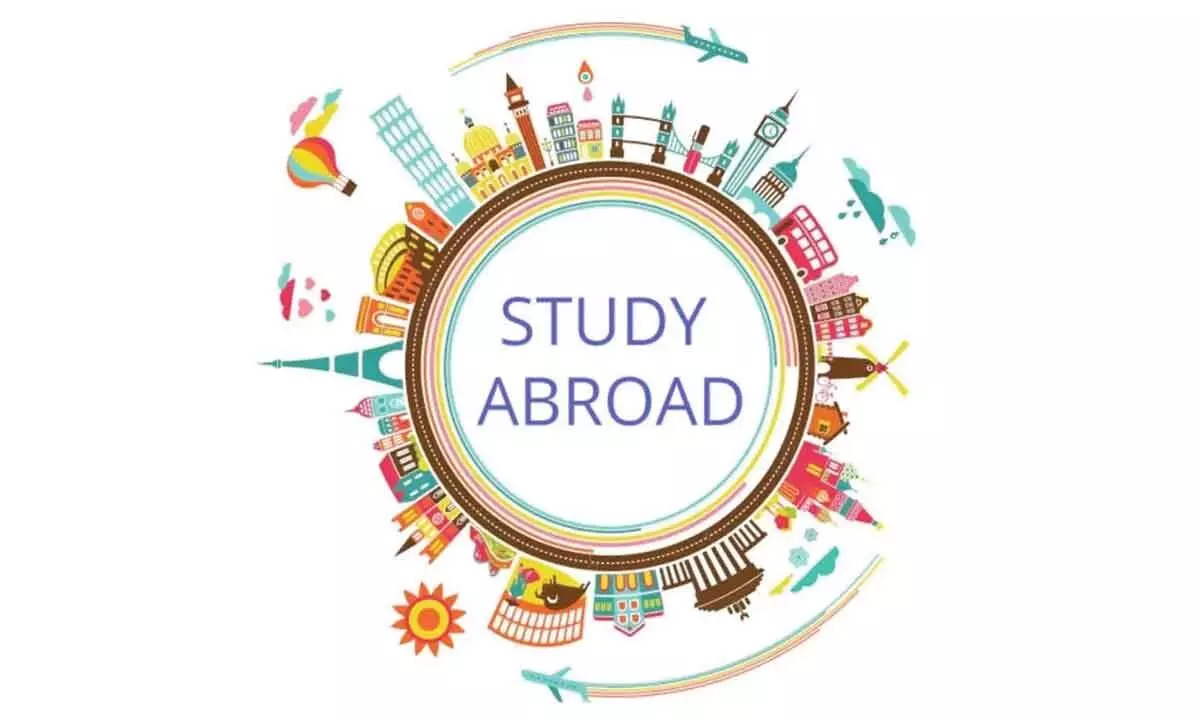Live
- Visakhapatnam: Spiritual meeting today
- SSC exam fee date extended
- Govt expedites Phase-I of scheme
- Remarks Against Ambedkar: Congress demands Union Home Minister Amit Shah’s resignation
- Decision likely on 2-child policy for rural body polls after caste census
- 2.79 lakh MTs of paddy purchased in Eluru dist
- MLA GV Anjaneyulu visits rain-hit agriculture fields
- Cyberabad sees 64 per cent Surge in Crime Rate
- Maternal Deaths: Collector O Anand expresses ire over medical staff
- TTD unveils vision for Global Outreach
Just In
Higher Education Abroad: Here's why Canada remains most sought-after country on Indian study abroad aspirants' radar


Anglophone countries have emerged as the most favored destination for higher education overseas for Indian students owing to their quest for enhanced learning outcomes and access to global opportunities.
Anglophone countries have emerged as the most favored destination for higher education overseas for Indian students owing to their quest for enhanced learning outcomes and access to global opportunities. Among these countries, Canada has established itself as one of the welcoming destinations because of its liberal immigration policies.
The country witnessed a quick recovery in its international student numbers amidst the pandemic. Canada's international student numbers rebounded to the pre-pandemic levels in 2021, witnessing strong growth in the number of Indian students.
As per data collected by Immigration, Refugees and Citizenship Canada (IRCC), in the academic years between 2015–16 to 2019–20, the number of Indian students studying in Canada increased by around 350%. In a similar vein, between January and November 2021, close to 1,30, 000 Indian students received approval to study in Canada.
So what is steering such a vast population of international students to Canada, especially from India? Let's deep-dive to figure out the student drivers.
Student drivers
Canada is the most sought-after study abroad location due to several factors working in its favor. According to the RedSeer report on the 'Higher Education Abroad' market, Canada replaced the US as the top destination for Indian students enrolling in higher education by 2019. In the foreseeable future, the nation is expected to maintain its momentum, according to the report.
Favorable migration policies
Canada's immigration policy is one of the liberal in the world. The Migration Integration Policy Index (MIPEX), a tool that measures policies to integrate migrants in countries across six continents, ranked Canada in the top 10 countries with a comprehensive integration approach. The MIPEX top 10 countries with a comprehensive integration approach fully guarantee equal rights, opportunities, and security for immigrants and citizens. Policies in these countries generally encourage the public to see immigrants as their equals, neighbors, and potential citizens. Its anti-discrimination policies and laws, including the multiculturism policies listed in the Canadian Charter of Rights and Freedoms, are Canada's greatest strength.
Additionally, the growing Indian diaspora is also a significant factor stoking student inflows from India. Canada heavily relies on international students to fill the gaps in skills and labor to improve their productivity. It has started initiatives such as the Global Skills Strategy to increase the inflows from highly skilled workers. The country's aging population is the reason behind welcoming international students with so much enthusiasm. In 2019, foreign-born people constituted one-fifth of Canada's population, one of the highest ratios for industrialized western nations.
Relatively lower cost of education
Canadian education is considerably more affordable than that of several other well-known study abroad locations throughout the world, which is another important factor in Canada's popularity. Moreover, universities in Canada are more likely to offer financial aid or scholarships to international students.
Work while you study
During university semesters, international students are permitted to work up to 20 hours per week on or off-campus, and they are also allowed to work full-time during breaks like the summer and winter holidays, all without the requirement for a work visa. International students enrolled in a program that requires work experience, such as through a co-op or internship program, are also authorized to work.
Post-study benefits
International students with a course duration of <2 years are eligible for a post-graduate work permit of equivalent duration as the course. If a student enrolls in a 2 years program(master or diploma), then they are eligible for a post-graduate work permit of 3 years.
Foreign nationals on a study visa can bring their spouses and dependent children to Canada. The spouse is also eligible for a Canadian open work permit.
Canada bound
Indian students' search for overseas study destinations is strongly driven by visa policy generally and the availability of post-study work opportunities in particular. In 2021, India topped the list of top markets for Canada, with 217,410 (y-o-y +21%) Indian students getting study visas. Moreover, the resolve of Canadian educators to diversify their international enrolments is steering many students to be Canada-bound.
(The author is the CEO and Founder, iSchoolConnect)

© 2024 Hyderabad Media House Limited/The Hans India. All rights reserved. Powered by hocalwire.com






